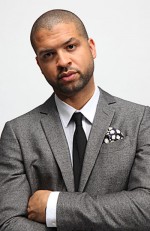Title
Pianist Jason Moran, this year’s Jazz artist in residence, exhorted students at his September 27 master class to focus on their deficiencies. “If you play with somebody good enough, they’re going to show your weaknesses more frequently onstage than you want—but that’s what you really want.”
Body
A 2010 MacArthur “genius” grant recipient—he was cited for his adventurous, genre-crossing jazz performances—Moran has created a name for himself as both a highly experimental musician and an exponent of the standard repertoire. His work runs the gamut from weaving music in and around recorded phone conversations and incorporating spoken word into angular jazz compositions to experimenting with well-worn standards and performing songs by the likes of his late mentor, avant-garde pianist Jaki Byard.
That September master class was, in part, a preamble to two sets he’ll lead and perform with student jazz ensembles on November 5 in Paul Hall. At those shows, the students will play selections from Moran’s compositions as well as tunes made famous by two of his major inspirations, Thelonious Monk and Fats Waller. Moran feels the songbook repertoire still has a wealth of insight to offer the searching musician who’s willing to experiment with new arrangements, harmonies, and other concepts they contain.
But while standards are an integral part of his work, Moran, 38, is also a product of his own era. When he was growing up in Houston in the 1980s, hip-hop artists were “sampling and remixing James Brown and Parliament-Funkadelic or Led Zeppelin or Kraftwerk,” he told The Journal in a recent phone interview. “That mode of looking at something that's been done already, and then scratching at another surface underneath it has become a major part of my practice.” He also draws his associations with contemporaries like hip-hop-infused jazz keyboardist Robert Glasper. Moran added that his own music and experiments at the musical fringe make the most sense when considered alongside his influences.
At the master class, Moran fondly recalled walking down Broadway from the Manhattan School of Music, where he got his bachelor’s degree, to soak in the sounds at the city’s myriad jazz clubs. Despite having little money, he found ways to get into the late-night sessions and create bootlegs of the performances, which he voraciously studied. He also actively sought mentors to guide him in expanding his own musical thinking, a habitual curiosity he now tries to inculcate into his own students and anyone who will be performing his music.
Moran surprised several students at the master class by calling them up to perform and then asked them probing questions about their musical ideas and influences before challenging them to demonstrate in their playing what they had told him in words. Moran hopes to similarly challenge the flexibility of the students he’ll be performing with at Paul Hall.
“It’s always good to meet students who are in that stage of discovery, before they become statues, before they really find out what they want to do,” he said. “I want to get it to a place where hopefully the students feel a bit uncomfortable; I don’t want them to feel necessarily comfortable in this setting. I like to poke at people’s perception of themselves and then just totally displace them and see what happens. I’ve had some really wonderful results out of that.”
Jazz is not a lecture course in Moran’s view, and even as a full-fledged veteran of the American jazz education system (he attended a performing arts high school in addition to M.S.M.), he finds himself constantly critiquing the strengths and shortcomings of conservatories and universities—he has taught at Yale, Dartmouth, the University of Pennsylvania, Eastman, the Museum of Modern Art, and other institutions. To him, mastery of music is not a process that can be neatly codified, and he is constantly looking for ways to improve the means of teaching jazz and its cultural relevance to new students.
“What I’m asking for from the students you can’t really quantify in a grading system—we have to continue to toy with the conservatory system,” he said in the interview. “If we do that, maybe we’ll continue to affect some good changes for the students coming through the system.”
Whether teaching or performing, listening or composing, Moran sees music as an ongoing conversation in which all sides are actively involved—he hopes for listeners to hear more than just the notes. “I think that audiences show up not only to be confronted with something but also see the reflection of themselves within the sounds that they are attracted to,” he said. “As you build that sound, you all get to build your sounds together, and you begin to influence each other—it’s not one way.”
The Juilliard School gratefully acknowledges Steinway and Sons for its sponsorship of the Juilliard Jazz Notables event with Jason Moran on October 29.





